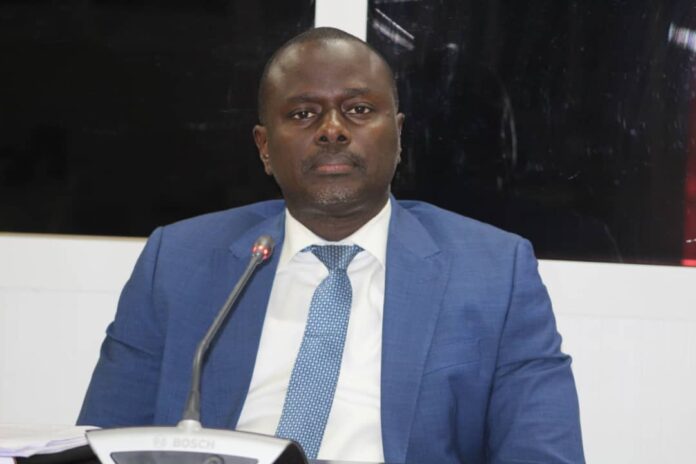By Nelson Manneh
Cherno Marena, a former Solicitor General and Legal Secretary in The Gambia has on Thursday, 25th March 2021 appeared before the Truth, Reconciliation and Reparations Commission (TRRC) to explain how the justice system helped and enabled former President Yahya Jammeh violate the human rights of Gambians.
He also touched on the laws that were used to deal with people regarded as Jammeh’s opponents.
He cited provisions of the Criminal Code such as Giving False Information to a Public Servant, Abuse of Office and Negligent of Officials Duty as well as the Economic Crime sDecree 1994.
He said all the Armed Forces Provisional Ruling Council Decrees which were made by the military Government between 1994 and 1996 formed part of the laws of the Gambia and were incorporated into the Constitution.
“Looking at the offence of giving False Information to a Public Servant, it was mostly used against whistle blowers,” he said.
He mentioned that the Criminal Code was enacted in 1933.
“The False Information offence was also used against those who write petitions to the President complaining about a wrong doing,” Marena said.
He explained that people have the constitutional right to write petition to the President.
Marena testified that even journalists found it difficult to do their work with this section.
“It was all based on Yahya Jammeh’s whims and caprices,” Marena said.
Marena testified that one of the examples of Whistle blowers case was the case of former Minister of Justice, Lamin Jobarteh, Pa Harry Jammeh and Njogu Bah, former Secretary General.
“This Whistle blowers provision was meant to net and control Jammeh’s opponents,” he said.
The witness said this made people reluctant to report certain things and sat on their constitutional right to petition the President. “People were afraid to provide information because they did not know what the consequences would be,” he said.
On the issue of negligence of official duties, he said even a minor mistake on administrative lapses; the individual would face negligence of official duty or Abuse of Office charges. He said some of those things could have been resolved administratively rather than resorting to prosecution.
“Some lawyers saw the charge of False Information as a defective charge as the President was not part of the Public Service,” he said.
He said Jammeh sharpened the weapon by replacing the word Public Servants to ‘Public Official’ because under the Constitution, the President was not a Public Servant but a Public Official.
He said after the change of regime, the Ministry commissioned the review of the Criminal Laws and have sent the proposed amendments to the National Assembly.
He said the proposed amendments have created more protection for whistle blowers.
Marena cited the case of former Secretary-General, saying Ousman Jammeh was convicted for negligence of official duty for allowing a sacked Permanent Secretary to receive salaries.
The Economic Crimes Act provides a trial in absentia which Marena said was deliberately put in the Act by the Junta because members of Jawara’s regime were already out of the jurisdiction. He said the same law could also hunt people who came up with the law under the Jammeh regime.
On the Office of the Director of Public Prosecutions, Marena said having lived through and saw how the Office of the DPP used to prosecute people, it was the reason the Draft Constitution give the DPP Office autonomy to stand on its own.
“In my humble view, the major factor which made the DPP to serve as Persecutions for the State was because it was occupied by non-Gambians who were willing to be involved in any kind of prosecutions because they do not belong to society. It was easy with them as they would leave the country and there was no risk of coming back to society to face the decision they made and their consequences,” he said.
He said Gambian lawyers avoided to work for the Ministry of Justice because they did not want to get involved in Jammeh’s ways. This is why the Ministry was headed by non-Gambians, he said.
He added that the payments attached also made some lawyers to leave the Attorney General chambers as they would earn more in private practice while others were not generally happy and eventually left the Ministry.
He recollected that Emmanuel Fagbele in 2006 called him and told him to stay beyond the ‘Juma’ Prayer as those involved in the Ndure Cham’s foiled Coup would be brought to the AG Chambers, but he told the DPP that he was conflicted in the case and would not be part of the prosecuting team.
He said he, therefore, sought for a transfer to the Civil Division, which was accepted. He said the lack of Gambian DPPs played a big role in that office. He said since 2017, the position of the DPP was announced twice, but no Gambian applied.
He said the office of the DPP should be separated from the office of the Minister of Justice and Attorney General.
He added that during his tenure as the Solicitor General, he used to make very sound and independent decisions.
“If the condition of Service of the DPP is not as attractive as that of the Court of Appeal Judges, then it would be difficult to have Gambians to occupy that Office,” he said.
On the issue of political interference and Gambians having machinery judges, Marena said these were judges who were not brought here by the Government, but came in as private lawyers.
He said some of them did everything to satisfy the person who had the authority to appoint them (The President).
He cited Justice Paul as an example who he said was very close to former President Yahya Jammeh and had even gone to Jammeh’s home in Kanilai; adding that Justice Paul presided over Baba Jobe’s case and convicted him for nine years in Prison.
Marena said Baba Jobe’s case and his subsequent killing were all politically motivated.
Marena said there was a systematic denial of bail by attaching difficult bail conditions and Hon. Halifa Sallah was one of the victims, who faced it.
He said there were magistrates who used to convict people who appear before them citing Magistrates Abeke, Alagbe and Kayode as examples.
“These Magistrates were so bad that they will take instructions from the then Chief Justice,” Marena said.
He said in future, judges and magistrates should not be hired to come to the Gambia – rather they should only come on technical assistance.
Another big problem was the security of tenure and independence of the Judiciary, Cherno said: “Yahya Jammeh said he did not believe in the Judiciary because the government paid them.”
“In the Lang Tombong Tamba and Sajor Fofana’s case, both of them were sentenced to death by the High Court, but their lawyer, Sheriff Tambadou argued that since the alleged Coup D’etat did not result in any death, they should not be sentenced to death, which the Supreme Court accepted,” he said.
The witness said immediately after that, Chief Justice Chawhan and Justices Raymond C. Sock and Gibou Janneh were all sacked. He explained that as a result of that, when Jammeh lost the elections in 2016 he (Jammeh) filed an election petition before the Supreme Court, but it could not work because there was no Judge to preside over his case.
About the Witness
Marena was born on the 5th August 1976 in Kerr Cherno Baba Village and did his LLB at the Islamic University of Malaysia.
Upon his return in 2002, he worked as a State Counsel, and in 2010 he became the Registrar General.
In November 2014, he was appointed as the Solicitor General till May 2016 when he was dismissed and he went into private practice. In 2017, he was re-appointed as the Solicitor General and was part of those who established the TRRC.


















